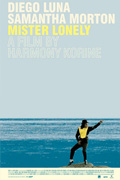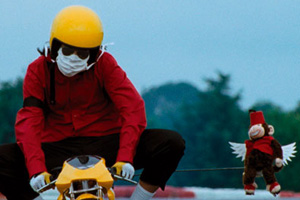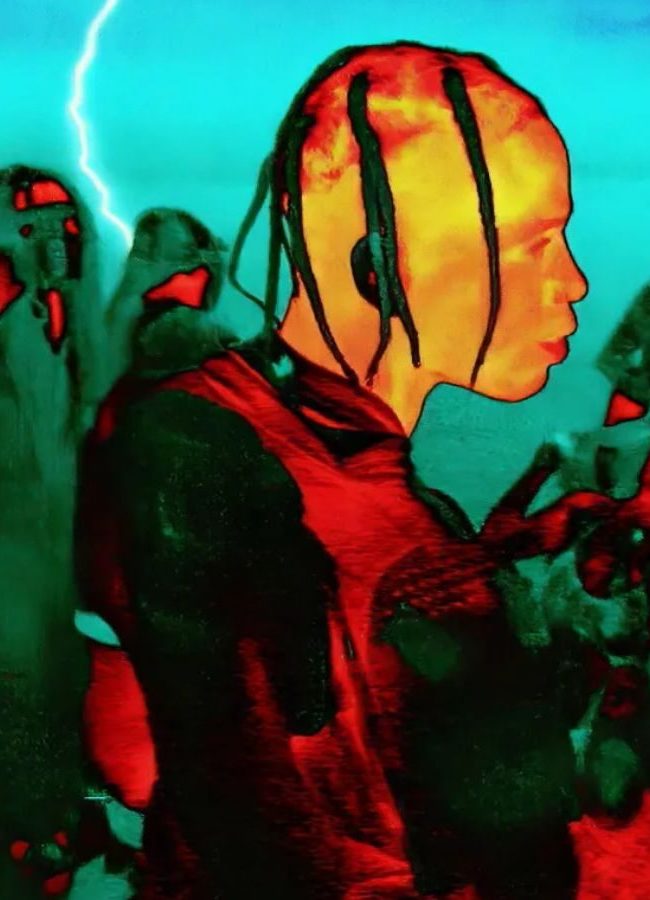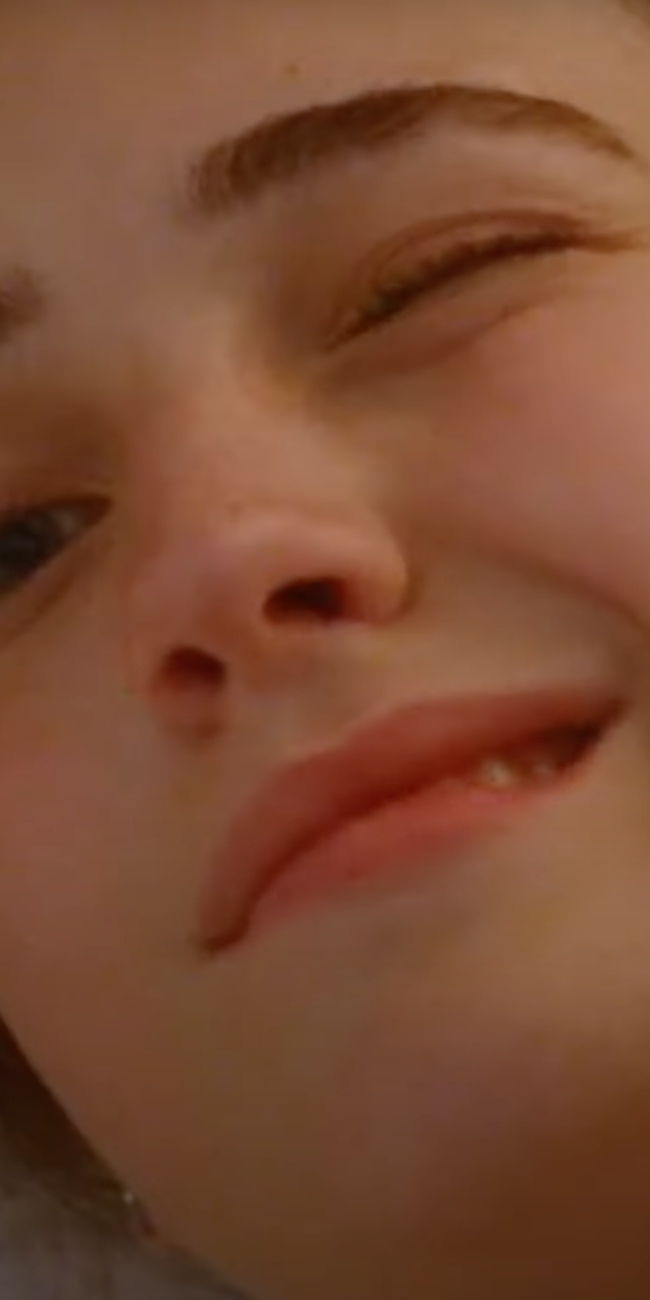
(Mister Lonely is now available on DVD through IFC Films. Watch a high resolution trailer of the film here, then buy it at Amazon.)
Following 1999’s julien donkey-boy, filmmaker Harmony Korine’s notoriously outrageous personal life caught up with him and sent him on a multi-year spiral into drug addiction and confusion. It’s a typical tale, in which the precocious, young artist, who has experienced an early dose of success, becomes disillusioned and instead suffocates his visual/sonic/verbal gift by drinking, swallowing, injecting, and smoking that precious gift into oblivion. And when that artist inevitably finds himself lost and broken on Rock Bottom Boulevard, the alternate escape routes seem utterly hopeless. Fortunately, Korine had the fortitude to shamble past Suicide Drive and Overdose Alley and instead hail a cab to Redemption Road, where his healing process could begin. Emerging from that thick, hazy cloud several years later, older and wiser yet having lost none of his exceptional talent, Korine has unleashed his most ambitious and personal film yet, the ravishing and unabashedly sincere Mister Lonely.
The basic plot description for Mister Lonely sounds like it could be the set-up for one of Korine’s more juvenile, smarmy jokes: A lonely Michael Jackson impersonator living in Paris befriends a Marilyn Monroe impersonator and travels with her to a Highlands mansion to live with a veritable commune of impersonators (Charlie Chaplin, Shirley Temple, The Pope, Queen Elizabeth, Madonna, Sammy Davis Jr., Buckwheat, Little Red Riding Hood, James Dean, etc.), where they work on assembling a spirited stage show that will wow audiences and inspire them to embrace their lives to the fullest. Yet while Korine’s comeback film retains the same sense of disregard for traditional narrative and contains the same elements of aesthetic invention brashly displayed in his first two directorial efforts, there is an overriding sense of sincerity and tenderness that establishes Mister Lonely as the work of an infinitely more mature artist. More than that, it never plays like an easily dismissible riff. On the contrary, it feels like an achingly personal memoir through which Korine has exorcised his own personal demons and learned to embrace life once again.
With such a superficially preposterous set-up, one must work extra hard to create a world that is believable. Korine’s casting of Diego Luna and Samantha Morton was perhaps his wisest decision overall. Both actors inhabit their characters with the utmost sincerity and grace. There is nothing funny or ironic about these individuals who have chosen to live their lives by impersonating two of the world’s most recognizable icons. They are truly tender souls, unsure of their own place in the world, yet confident in their ability to make other people happy through the gift of imitation and performance. Morton’s Marilyn is a particularly fragile creation, a quiet, sweet female whose husband, Charlie Chaplin (Denis Lavant), has her on the brink of tears at every waking moment. With Michael, she has found a kindred spirit and a possible mate for the ages. Unfortunately, circumstances won’t allow her to give in to him completely, which makes her life with her insensitive, brutish husband that much more stifling.
As these jovial impersonators continue to exist in a blissful, innocent cloud on their commune, they must eventually contend with moments of extreme loss and disappointment, which arrive like sad dreams in the night. And as they continue to work towards their ultimate goal, over in Panama, an un-directly-related story unfolds, in which an excitable priest (Werner Herzog) discovers that several of his nuns can jump out of a plane and use prayer to parachute themselves to miraculously safe landings. In the past, Korine’s complete and utter disregard for narrative convention was exciting, yet it never felt as purposeful as it does here, for while these two distinct storylines have no actual link, they nonetheless feel unified and add to the film’s throbbing, heartfelt soul. In the world of Mister Lonely, every single person wants to embrace the miracle of existence, whether it’s a priest in Panama or a Sammy Davis Jr. impersonator in Scotland. For Michael especially, life is a precious gift that is not to be taken for granted. His quest to find inner peace and contentment is what keeps him going.
 While Korine’s earlier films contained many moments of sheer artistic brilliance, they never congealed into a deeper, unified feeling in the way that they do here. Take the opening shot, for example. In a haunting slow-motion one-take set to Bobby Vinton’s “Mr. Lonely,” the image tracks Michael Jackson as he rides a mini-bike on a racetrack, pulling a stuffed monkey behind him on a string. Yes, that sounds silly. Yet, with this shot, Korine has established his purpose. There is a monkey on this character’s back (as there was a monkey on Korine’s back), and Mister Lonely will be about the fantastical journey this individual must take to shake off that monkey once and for all.
While Korine’s earlier films contained many moments of sheer artistic brilliance, they never congealed into a deeper, unified feeling in the way that they do here. Take the opening shot, for example. In a haunting slow-motion one-take set to Bobby Vinton’s “Mr. Lonely,” the image tracks Michael Jackson as he rides a mini-bike on a racetrack, pulling a stuffed monkey behind him on a string. Yes, that sounds silly. Yet, with this shot, Korine has established his purpose. There is a monkey on this character’s back (as there was a monkey on Korine’s back), and Mister Lonely will be about the fantastical journey this individual must take to shake off that monkey once and for all.
Other moments of seeming insignificance, which many viewers might dismiss as Korine indulging his more juvenile urges, are actually much more than that. Take the shot of Buckwheat on a donkey, hilariously discussing his love of chicken and breasts. Yes, this moment is laugh-out-loud funny. But it also works as a powerful commentary on the damaging Sambo theory that has plagued Hollywood throughout the entire 20th Century. Or consider Herzog’s authoritative priest, who works as a direct metaphor for that forceful, defiant director who can convince his actors to try anything. Or, in a more seemingly insignificant case, how about Shirley Temple’s explanation of why Buckwheat might want to spend time in the chicken coup and pretend he’s a chicken. On the surface, this seems like a sweet, frivolous little moment. But in reality, her interpretation could very well be Korine’s overarching manifesto:
I don’t know why he likes being a chicken. But I think it’s because he just… just likes the way chickens live and he wants to be a chicken. And it’s just like… a bit like… if I really liked maybe a dolphin, and I really wanted to be a dolphin, so I could see how a dolphin’s life worked. Maybe it’s just like that.
This isn’t just a throwaway moment in which viewers are meant to giggle at this cute and funny little girl. This is Harmony Korine (and his brother, co-screenwriter Avi) giving a sincere interpretation of what compels someone to devote his or her life to becoming someone else. Mister Lonely is filled with these striking images and sound bites, which might seem fluffy and inconsequential on the surface, yet if one digs deeper, they reveal themselves to be much more poignant and profound.
Sonically, visually, and structurally audacious, Mister Lonely firmly establishes Harmony Korine as a major voice in world cinema. His poetic reverie of recovery is an enthralling blend of the fantastical and realistic, which bursts forth with life in unexpected, revelatory ways. Perhaps Korine’s greatest achievement is that while his bittersweet tale incorporates elements of his many influences—Herzog’s Bruno S. films, Claire Denis, von Trier, Fassbinder, Bunuel, Malick, Fellini, the Marx Brothers, just to suggest a few—he never succumbs to them at any given point. Instead, he delivers a wholly unique vision that could have come from no one else. Farewell, Mister What Might Have Been. Hello, Mister What Has Become.
— Michael Tully
levitra overnight
levitra generika
levitra kaufen











